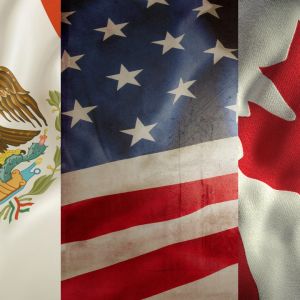The U.S. government is moving fast to reopen the USMCA, setting the stage for what could become a brutal trade clash with both Mexico and Canada. The Office of the U.S. Trade Representative is expected to begin public consultations in the next few weeks. Under the 2020 law that launched the pact, those talks must officially start before October 4. According to reports from the Wall Street Journal, Trump’s team had already told some stakeholders it was coming soon before quietly delaying it. This upcoming process marks the start of a mandatory six-year review baked into the USMCA deal signed in 2020. Once public comments are gathered, the administration must hold at least one hearing and present a full update to Congress by January 2026. That must be followed by a formal three-country meeting before July 1, 2026. Trump ramps up pressure with tariffs and threats Trump has wasted no time muddying the waters ahead of the renegotiation. Even though he called the USMCA one of the signature wins of his first term, replacing the 1992 NAFTA deal he claimed wrecked U.S. industry, his second term has already chipped away at it. He slapped tariffs on Mexico and Canada not long after getting into office, justifying them with claims that both countries aren’t doing enough to stop drug trafficking. A 25% tariff was imposed broadly at first. Then, later, goods that met USMCA rules were excluded. But huge chunks of trade are still caught in the crossfire. The automaking industry, with its deep supply chains running through all three countries, is one of the hardest hit. And yes, technically, USMCA-compliant goods are exempt, but try explaining that to companies watching their cross-border shipments rack up extra costs overnight. Canada and Mexico brace for a new round of demands Canadian Prime Minister Mark Carney talked with Trump earlier this week. On Wednesday, Carney told reporters the two sides “are making progress,” but he wasn’t exactly optimistic about a quick breakthrough. Canada wants the tariffs lifted, especially on steel, aluminum, autos, and lumber, but there’s no sign of that happening right away. Carney said a big chunk of Canada’s exports are still safe under USMCA rules, but the rest remains exposed to Trump’s trade tactics. Meanwhile, across the southern border, U.S. Secretary of State Marco Rubio met with Mexican President Claudia Sheinbaum at the National Palace in Mexico City on Wednesday. Their top issue? Security. The U.S. wants stronger drug enforcement before offering any broader trade relief. The Trump team made that clear when it threatened more tariffs unless Mexico increased its crackdown on trafficking. Rubio told reporters that Mexico has shown real interest in cooperating, and he seemed satisfied with the direction things are headed. Still, Trump gave Mexico a 90-day extension on current tariffs back in August, saying, “The complexities of a deal with Mexico are somewhat different than other nations.” That pause affects things like cars, aluminum, and steel, but not other products that already follow USMCA standards. Mexico ships nearly 80% of its exports to the U.S., so there’s no real choice here. Sheinbaum’s team has to engage. But it’s not going to be on U.S. terms without a fight. Back in Washington, Senator Bernie Moreno, a Republican from Ohio and vocal Trump supporter, wants tighter content rules. He said on Thursday, “ You have to up the U.S. content dramatically, especially in the automobile industry. In fact, that’s one of the things I talked to the Mexican leadership about, which is a recognition that there’s just going to be a lot less cars made in Mexico that end up in the U.S. ” Moreno’s position is exactly the kind of thing that will blow up talks if pushed too hard. Mexico’s factories don’t exist just to meet American political goals. Beyond the auto sector, U.S. officials have flagged other sticking points. These include Mexico’s energy policies favoring government-run companies, barriers in the telecom market, restrictions on corn and cotton imports, and soft copyright protections. Those issues will be front and center once negotiations actually begin. Even Mexico’s Economy Minister Marcelo Ebrard knows what’s coming. After meeting with U.S. trade and commerce leaders this week, he said, “I can see that the coming months and the review of the USMCA won’t be easy. But we need each other to be competitive.” The smartest crypto minds already read our newsletter. Want in? Join them .















